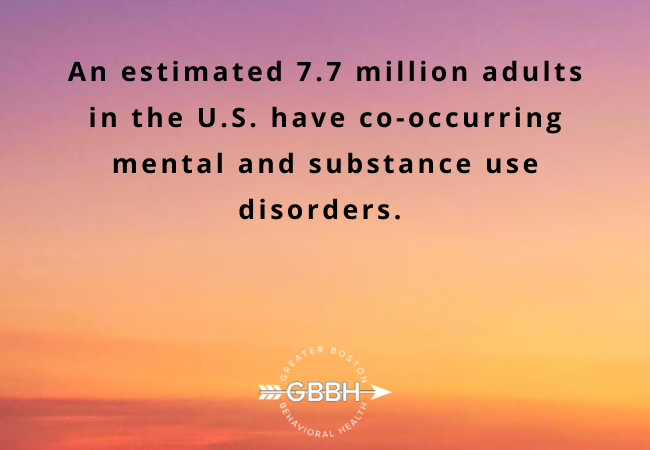Mental health challenges are complex, and they don’t always exist in isolation. For many individuals, mental health disorders can co-occur with substance use issues, creating a complicated set of symptoms and treatment needs. This is known as co-occurring disorders or dual diagnosis, where individuals simultaneously experience a mental health disorder—such as anxiety, depression, or PTSD—and a substance use disorder (SUD), such as alcohol or drug addiction.
If you or someone you care about is dealing with co-occurring disorders, it’s important to understand how mental health programs can effectively treat both conditions at the same time. At Greater Boston Behavioral Health, we specialize in providing integrated treatment that addresses both mental health conditions and substance use issues, giving individuals the best chance at recovery.
In this article, we’ll dive into what co-occurring disorders are, the challenges they pose, and how mental health programs can provide comprehensive care to help individuals manage both conditions. Whether you’re dealing with depression and substance use, anxiety and alcohol abuse, or PTSD and drug addiction, mental health programs like Intensive Outpatient Programs (IOP), Partial Hospitalization Programs (PHP), and therapy are specifically designed to treat these complex conditions.
What Are Co-Occurring Disorders?
Co-occurring disorders refer to the presence of two or more disorders in the same individual, with the most common combination being a mental health disorder (such as depression, anxiety, or trauma) and a substance use disorder (alcohol or drug addiction). However, co-occurring disorders can also involve two different mental health conditions, such as depression and bipolar disorder.
When a person struggles with co-occurring disorders, one condition often exacerbates the other, creating a vicious cycle that can make it more difficult to manage symptoms and find effective treatment. For example, a person with PTSD might self-medicate with alcohol or drugs to cope with emotional pain, but substance use only worsens the trauma symptoms and creates additional challenges like impaired judgment or negative physical effects.
Examples of Co-Occurring Disorders:
- Mental Health + Substance Use: Anxiety combined with alcohol use disorder.
- Mental Health + Mental Health: Depression combined with generalized anxiety disorder.
- Substance Use + Substance Use: Alcohol addiction and opioid abuse.
Treatment for co-occurring disorders requires an integrated approach, as each condition influences the other. Treating them separately often results in poor outcomes, as the underlying issues of both disorders need to be addressed simultaneously for the individual to make lasting progress.
How Do Mental Health Programs Treat Co-Occurring Disorders?
Effective treatment for co-occurring disorders is possible, but it requires a comprehensive, integrated approach that treats both disorders at the same time. This integrated care ensures that the mental health condition and substance use issues are addressed in a way that supports overall recovery and wellness.
At Greater Boston Behavioral Health, our team uses evidence-based therapies, psychiatric support, and medication management to provide holistic care to individuals struggling with co-occurring disorders.
1. Integrated Treatment Plans
One of the key principles of treating co-occurring disorders is the creation of an integrated treatment plan. This approach recognizes the interconnectedness of mental health and substance use issues and focuses on addressing both conditions simultaneously. An integrated plan provides a holistic view of the person’s needs, ensuring that therapy, medication, and coping strategies are designed to treat both conditions in tandem.
For example, if an individual struggles with depression and substance use, the integrated treatment plan would combine therapies that address both the depressive symptoms and the substance abuse behaviors. This could include cognitive restructuring to challenge negative thinking patterns contributing to depression, alongside strategies for managing cravings and preventing relapse related to substance use.
Benefits of Integrated Treatment:
- Comprehensive care that treats the root causes of both disorders.
- Holistic approach that incorporates physical, emotional, and psychological health.
- Better outcomes due to the simultaneous treatment of both conditions.
2. Evidence-Based Therapies
Mental health programs that treat co-occurring disorders often rely on evidence-based therapies that have been proven to be effective in treating both mental health and substance use disorders. These therapies are designed to address the symptoms and behaviors related to both conditions.
Common Therapies Used to Treat Co-Occurring Disorders:
- Cognitive Behavioral Therapy (CBT): CBT helps individuals recognize and challenge negative thought patterns that contribute to both mental health issues and substance use. It teaches individuals healthier ways of thinking and behaving, which is crucial for managing both anxiety, depression, and addiction.
- Dialectical Behavior Therapy (DBT): DBT is a specialized form of CBT that focuses on emotional regulation, distress tolerance, and mindfulness. It’s particularly effective for individuals with emotional dysregulation, trauma, or substance abuse issues, helping clients learn how to manage intense emotions without resorting to substance use.
- Trauma-Focused Cognitive Behavioral Therapy (TF-CBT): TF-CBT is especially effective for those who have experienced trauma and use substances to cope with the resulting pain. This therapy helps individuals process and heal from past trauma while also teaching coping mechanisms to reduce the risk of substance abuse.
- Motivational Interviewing (MI): MI helps individuals explore and resolve ambivalence about making changes. It is particularly effective for clients who struggle with substance use, as it strengthens their motivation to engage in treatment and reduce addictive behaviors.
These therapies work together to provide clients with the tools they need to address the mental health and substance use components of their recovery.
3. Psychiatric Support and Medication Management
For individuals with co-occurring disorders, psychiatric support and medication management are often necessary to stabilize symptoms and prevent relapse. Medication can help manage symptoms of mental health disorders like depression and anxiety, while also addressing cravings or withdrawal symptoms related to substance use.
Types of Medications Commonly Used:
- Antidepressants (SSRIs, SNRIs): Used to treat depression and anxiety disorders that often co-occur with substance use.
- Anti-anxiety medications: Help alleviate symptoms of anxiety, which can reduce the urge to self-medicate with substances.
- Medications for substance use: Medications such as methadone, buprenorphine, and naltrexone are commonly prescribed to manage opioid addiction, alcohol dependence, or other substance use disorders.
Medication can be a critical part of treatment for co-occurring disorders, as it helps reduce symptoms, stabilize mood, and prevent relapse.
4. Group Therapy and Peer Support
Group therapy is a key component of treatment for co-occurring disorders. It provides a supportive environment where clients can connect with others who are experiencing similar struggles. Peer support is invaluable for reducing feelings of isolation and fostering a sense of shared understanding and empathy.
In group therapy, individuals work together to build emotional resilience, develop coping skills, and practice new strategies in a safe, non-judgmental setting. Group therapy is especially beneficial for people dealing with both mental health and substance use challenges, as it provides them with the opportunity to learn from others and gain new perspectives on managing symptoms.
5. Ongoing Aftercare and Support
After completing treatment, it’s crucial for individuals with co-occurring disorders to continue their recovery journey with ongoing support. Aftercare programs provide the continued therapy, support groups, and relapse prevention strategies needed to ensure long-term success. For individuals with co-occurring disorders, aftercare is particularly important, as it helps maintain stability and prevent a return to substance use or mental health crises.
Aftercare options may include:
- Relapse prevention programs
- 12-step groups (e.g., AA, NA)
- Individual or group therapy to continue building coping skills and emotional resilience
Who Can Benefit from Treatment for Co-Occurring Disorders?
Treatment for co-occurring disorders is ideal for individuals experiencing:
- Mental health disorders like anxiety, depression, bipolar disorder, or PTSD combined with substance use disorders (e.g., alcohol or drug addiction).
- Individuals with dual mental health conditions (e.g., depression combined with anxiety).
- Those seeking integrated care for both conditions rather than receiving separate treatments.
Why Choose Greater Boston Behavioral Health?
At Greater Boston Behavioral Health, we specialize in treating co-occurring disorders with an integrated, compassionate approach. Our experienced team of therapists, psychiatrists, and counselors works collaboratively to create a customized treatment plan that addresses both mental health and substance use issues.
Why Choose Us:
- Personalized care designed specifically for individuals with co-occurring disorders.
- Evidence-based therapies like CBT, DBT, and Trauma-Focused CBT to address the complex nature of dual diagnosis.
- Psychiatric support and medication management to help stabilize symptoms and prevent relapse.
- Group therapy and peer support to foster community and reduce isolation.
Conclusion
Struggling with co-occurring disorders—whether it’s a combination of mental health issues like anxiety or depression with substance use—can feel like an overwhelming challenge. The complexity of managing multiple conditions requires specialized care that addresses both aspects simultaneously for effective treatment. Greater Boston Behavioral Health understands the intricacies of co-occurring disorders and is here to provide comprehensive, personalized care to help you overcome these challenges.
Our Integrated Treatment Plans focus on healing the whole person, not just one aspect of the disorder. By combining evidence-based therapies, psychiatric care, medication management, and peer support, we create a holistic approach that targets both mental health and substance use issues simultaneously. This integrated care model has been proven to yield better outcomes, as it treats the underlying causes of both disorders, setting you up for a healthier, more fulfilling life.
Frequently Asked Questions (FAQ)
What are co-occurring disorders?
Co-occurring disorders, also known as dual diagnosis, occur when an individual experiences both a mental health disorder (such as depression, anxiety, or PTSD) and a substance use disorder (like alcohol or drug addiction) simultaneously. Treatment for co-occurring disorders requires an integrated approach to address both conditions at the same time.
How are co-occurring disorders treated?
Co-occurring disorders are treated with an integrated treatment plan, which addresses both the mental health disorder and the substance use disorder simultaneously. Treatment typically includes a combination of evidence-based therapies (such as CBT and DBT), psychiatric support, medication management, and group therapy to ensure a comprehensive and holistic approach.
What types of therapies are used to treat co-occurring disorders?
Several therapies are used to treat co-occurring disorders, including:
-
Cognitive Behavioral Therapy (CBT): Helps individuals identify and reframe negative thinking patterns contributing to both mental health and substance use.
-
Dialectical Behavior Therapy (DBT): Focuses on emotional regulation, mindfulness, and distress tolerance, making it especially useful for those with emotional instability and substance use issues.
-
Trauma-Focused CBT: Focuses on processing past trauma, which is often at the root of both mental health and substance use issues.
How long does treatment for co-occurring disorders take?
The duration of treatment for co-occurring disorders depends on the severity of the conditions and the individual’s progress. Programs like Intensive Outpatient Programs (IOP) typically last 6–12 weeks, while ongoing therapy may be required as part of aftercare or long-term recovery.
Can medication help with co-occurring disorders?
Yes, medication is often an essential part of treating co-occurring disorders. Psychiatric care can help assess the need for medications such as antidepressants, anti-anxiety medications, or medications for substance use like methadone or buprenorphine. Medication is used alongside therapy to stabilize symptoms and promote recovery.
What is the benefit of integrated treatment for co-occurring disorders?
Integrated treatment addresses both the mental health disorder and substance use issue simultaneously, which is crucial for successful recovery. Treating both conditions at the same time reduces the likelihood of relapse and ensures a more comprehensive, long-lasting recovery.


